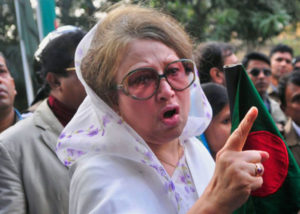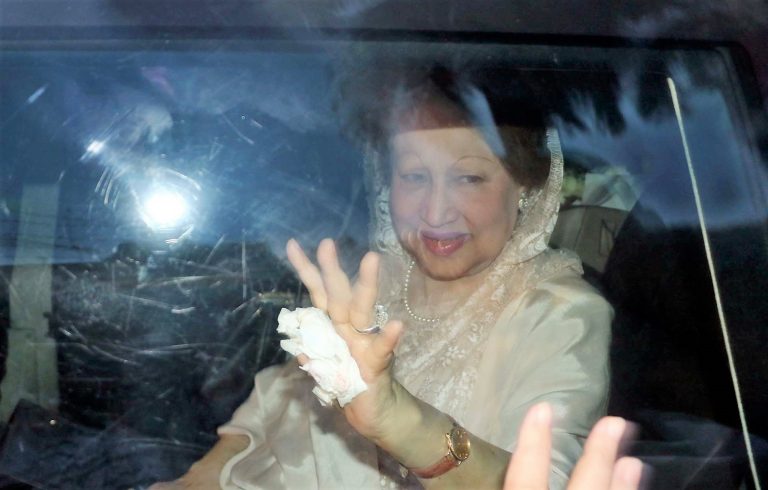
Bangladesh: Ex-Prime Minister Goes To Prison, Current PM Rejoices
On February 8, the day a court sent Bangladesh’s former prime minister, Khaleda Zia, to prison for stealing money from a trust fund, current prime minister and Zia’s archrival, Sheikh Hasina, rhetorically asked a public rally: “Where is she?”
Hasina’s question refreshed memories of many who heard a similar nasty utterance made 45 years ago by her famous father, Sheikh Mujibur Rahman, founding president of Bangladesh, who asked: “Where is Siraj Shikder?” Shikder, a self-styled Maoist revolutionary who led a fringe political outfit seeking to violently overthrow the government, had mysteriously died in police custody.
Even though the circumstances are quite different, the two rants reflect a common theme: an authoritarian bent in a ruler who deploys state machinery to suppress political opponents instead of dealing with them politically. Hasina faces general elections this year, and the guilty verdict rendered Zia disqualified to hold office.
Sheikh Mujib was the most popular of all the political figures the land of the Bengalis has ever produced, and he successfully galvanized Bengali nationalism, leading to Bangladesh’s creation through a bloody war in 1971.
Faced with dismal administrative failures, which spawned massive public discontent, Mujib pushed the country into a one-party political system, despite being a life-long champion of British-style parliamentary democracy. His assassination in 1975 plunged the nation of 165 million Bengalis into a dark period of upheavals lasting nearly two decades until democracy was restored in the early 1990s.
His daughter, Hasina, today rules a country that is a democracy in theory only. She won a third term in an election foolishly boycotted by Zia’s political organization, the Bangladesh Nationalist Party. In Bangladesh, press freedom is nonexistent — journalists muzzled by the government fear for their safety; disappearances of political opponents are commonplace; civil service is filled with political cadres; the judiciary coerced into submission implements the prime minister’s wishes; and the military remains loyal, thanks to her generosity towards its spending spree.
Just three months ago, the nation’s chief justice, S.K. Sinha, was forced into exile under mysterious circumstances amid unsubstantiated government accusations of money laundering and graft. His real crime: He refused to give full credit to the prime minister’s father for creating Bangladesh. Dhaka’s rumor mills were also rife with gossips that the Supreme Court could declare prime minister’s election invalid. The justice rubbed the ruling Awami League party on the wrong side. Under his leadership, the court voided a constitutional amendment giving parliament power to fire justices. Before leaving for Australia, a confused-looking Sinha told journalists he was a “bit worried about the independence of the judiciary.”
An independent judiciary would have thrown out the case against Zia. Although Zia’s son and heir apparent, Tarique, who lives in exile in London and has been sentenced to 10 years in prison along with his mother, is widely known for illegally distributing state favors in exchange for massive bribes, hardly anyone at home or abroad believes Zia herself stole a meager $250,000 from an orphanage.
As the opposition leaders claim, this case has more to do with politics than justice. There is precedence in Bangladesh. Former military ruler, Gen. H.M. Ershad, who now heads the third leading political party in Bangladesh, was imprisoned in a similar corruption case after he was forced out of power. He was released from prison under a deal with Hasina, but his case still remains pending in appeal after more than 20 years. Both Hasina and Khaleda used the case to manipulate Ershad to their political advantage.
Hasina, 71, who wishes to install her son, Sajeeb Wazed Joy, as her successor, views Zia,72, and Tarique as the main contenders for power in Bangladesh. So she intends to keep the judicial sword hanging over her rivals in an attempt to prolong her rule and maintain her political party’s grip over the country for years to come.
B. Z. Khasru, is editor of The Capital Express in New York and author of “Myths and Facts Bangladesh Liberation War” and “The Bangladesh Military Coup and the CIA Link.” He is working on a new book, “The King’s Men, One Eleven, Minus Two, Secrets Behind Sheikh Hasina’s War on Yunus and America.”

